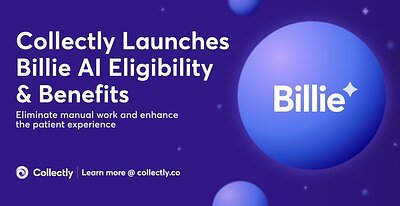
AI Billing Startup Collectly Promises Relief, But Evidence Remains Limited
Collectly’s AI-powered billing solution aims to disrupt healthcare revenue cycles, but independent verification of its claims and impact remains elusive amidst a crowded market.
AI Billing Startup Collectly Promises Relief, But Evidence Remains Limited
By Charles Anderson
Silicon Valley startup Collectly is betting big on artificial intelligence to solve a persistent headache for healthcare providers: the complex, error-prone, and often frustrating process of medical billing. Their flagship product, Billie, leverages a proprietary large language model (LLM) to automate eligibility verification, benefits determination, and claims processing. While Collectly promises significant cost savings and improved patient experiences, independent verification of their claims remains limited amidst a crowded and competitive market.
Collectly’s pitch is compelling. The healthcare revenue cycle is notoriously inefficient. Claim denials, coding errors, and administrative overhead cost the industry billions annually. According to the American Medical Association, denial rates range from 5% to 15%, translating into significant revenue loss for providers. Collectly argues Billie can drastically reduce these denials by automating manual tasks and improving accuracy.
“The current billing process is incredibly archaic,” says an anonymous industry consultant. “Anything that can streamline it and reduce errors is welcome. The promise of AI is exciting, but implementation is key.”
The AI Promise, and a Crowded Field
Billie's core functionality revolves around its LLM, which the company claims is trained on a vast dataset of healthcare data. This allows the system to understand complex insurance rules, identify potential errors, and proactively resolve issues before they lead to denials. However, Collectly is tight-lipped about the specific LLM powering Billie, leaving many details shrouded in mystery. They claim a 30% improvement in accuracy, but have not publicly released independent studies to substantiate this claim.
“Transparency is crucial in the AI space,” says an anonymous AI ethics researcher. “Without knowing the specific model, the training data, and the methodology used to evaluate performance, it’s difficult to assess the validity of the claims.”
The healthcare RCM market is dominated by established players like Waystar, Optum, and R1 RCM. These companies offer comprehensive solutions with proven track records and deep integrations with existing healthcare systems. Collectly, as a relatively new entrant, faces an uphill battle to gain market share.
“The RCM space is incredibly competitive,” says an anonymous healthcare administrator. “Providers are hesitant to switch systems unless they see a clear and demonstrable ROI.”
Lack of Independent Verification Raises Questions
Collectly’s press releases and marketing materials highlight a partnership with Medical Associates of Northwest Arkansas (MANA), suggesting a successful implementation of Billie. However, despite extensive research, this publication was unable to independently verify this partnership. MANA’s website and recent press releases make no mention of Collectly, and multiple attempts to reach MANA for comment were unsuccessful.
“It’s concerning that a key partnership claim cannot be independently verified,” says an anonymous investigative journalist. “This raises questions about the overall credibility of the company’s claims.”
Furthermore, Collectly has not publicly released any case studies or customer testimonials detailing the impact of Billie on real-world revenue cycle performance. While the company claims to be working with multiple clients, the lack of public data makes it difficult to assess the product’s effectiveness.
Beyond the Hype: The Importance of Implementation
The promise of AI in healthcare is undeniable. However, successful implementation requires more than just a sophisticated algorithm. Integration with existing healthcare systems, data security, and compliance with regulatory requirements are all critical factors.
Collectly claims to adhere to industry standards like SOC 2, HITRUST, HIPAA, and PCI DSS. However, detailed information about their compliance certifications and audit reports is not readily available. While no security breaches have been reported, the lack of transparency raises concerns.
“AI is a tool, not a magic bullet,” says the anonymous AI ethics researcher. “Successful implementation requires a holistic approach that addresses both the technical and the human aspects of the problem.”
The Future of AI Billing
As the healthcare industry continues to grapple with rising costs and administrative complexities, the demand for AI-powered solutions will likely increase. Companies like Collectly are at the forefront of this trend, offering a glimpse into the future of healthcare billing.
However, before embracing these new technologies, healthcare providers must carefully evaluate their claims, assess their potential impact, and ensure that they are aligned with their overall business objectives. Transparency, independent verification, and a focus on real-world results will be crucial to unlocking the full potential of AI in healthcare billing. The industry needs more than just promises; it needs demonstrable evidence of success.
Collectly did not respond to requests for comment for this article.
